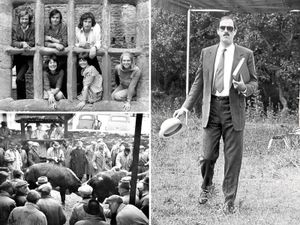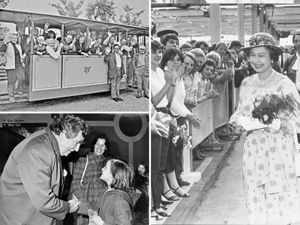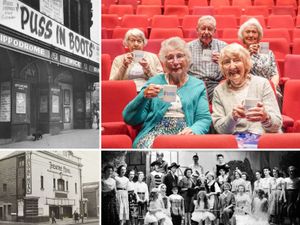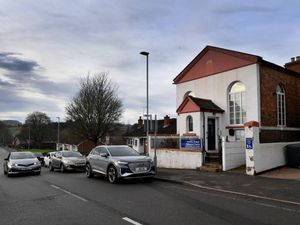Remembering the rebel riders who changed the face of British cycling forever
It was an event unlike any the country had seen before. Thousands jostled for position outside the park, cheering wildly as they caught a fleeting glimpse of the spectacle.
Eighty years ago this week, Wolverhampton hosted the finale of Britain's first cycle race to be held legally on Britain's roads, after a course that wound its way through Mid Wales and Shropshire. And for a country still in the depths of war, it was just the tonic the people needed.
"It was probably the biggest landmark race in British history," says Dave Dungar, of the Wolverhampton Society.
The event began in the Welsh border town of Llangollen and wound its way through Shropshire, before finishing in Wolverhampton's West Park – which will be the start and finish point of the cycling time trials in the forthcoming Commonwealth Games.
For Dave, the 1942 race has a very personal significance – second place was taken by Cecil James Anslow, the man who would become his stepfather.
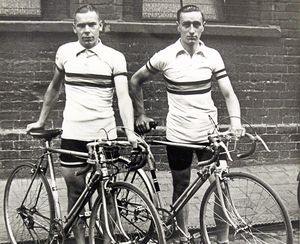
"He tried to get me into cycling when I was a teenager, he bought me a bike, but I was never really interested," says Dave, 68, who lives in Pattingham.
"He was always at his happiest when he was outdoors on his bike."
Legend has it that Anslow would have won the 59-mile race had he not got lost with the finishing post almost in sight.
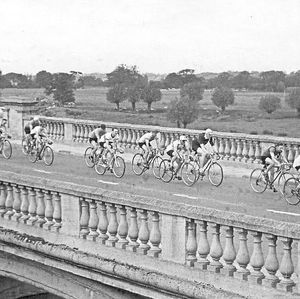
"The story goes that they got there before the marshals were ready, so there was nobody there when they got to Tettenhall.
"He went the long way round Tettenhall Green, allowing Albert Price to overtake him right at the end.
"If that was true, it would be quite ironic as we moved to a house just off Tettenhall Green."
The race, which raised money for the Express & Star's Comforts Fund to help those serving in the Second World War, was the brainchild of another Wolverhampton cycling legend, Percy Stallard. But while it might have brought plenty of excitement, it was also mired in controversy, even leading to Stallard being suspended by the National Cyclists' Union.
Mass-start road racing, where cyclists all started together and competed to be first at the finishing line, were becoming increasingly popular in mainland Europe in the late 19th century, with the Tour de France and Tour of Italy enjoying great popularity. But police in the UK were concerned about the disruption they were causing, and effectively put a stop to them in 1894. The National Cycling Union officially banned such races three years later, and instead opted to hold "time trials", where "inconspicuously clothed" competitors started the route at different times. Ironically, it is a similar event, the "time trials", which will form Wolverhampton and Dudley's contribution to the Commonwealth Games in August this year.
Stallard, who finished 12th in the world road-race championship in Monthlery, France, in 1933, seventh the following year when the competition was held in Leipzig, decided to train his own team of Wolverhampton cyclists, and campaign for the adoption of massed-start races on British roads.
He argued that there was no specific law that actually forbade massed-start racing, but few seemed to be listening.
"This is the only country in Europe where this form of sport is not permitted," he wrote in 1941. "There seems to be the mistaken idea that it would be necessary to close the roads. This, of course, is entirely wrong."
But while the cycling establishment was disinterested in his pleas, the lack of road traffic during the Second World War gave Stallard a window of opportunity. Having announced in April 1942 that he intended to hold a road race from Llangollen to Wolverhampton, the competition went ahead on June 8 without police objections. The National Cycling Union was less impressed; Stallard was suspended for his defiance, as were all 28 cyclists who took part, leading to the formation of the breakaway British League of Racing Cyclists 18 months later. The schism ended in 1959 when the two bodies merged to form British Cycling Federation.
According to the Express & Star's report, the 1942 race was a huge success, with more than 2,000 spectators crowding outside the park to watch the thrilling finale.
"A newcomer to massed-start racing, Albert Price of Wolverhampton rode a beautifully judged race to dash over the finishing line two lengths in front of C J Anslow, also of Wolverhampton," the paper reported.
"The event was a complete success, and must rank as a milestone in this style of racing," the report added.

Another interesting story is that, due to the fact cyclists had little experience of "bunched" racing at the time, Stallard asked them to refrain from out-and-out competitive racing until the halfway point, which was Atcham Bridge in Shrewsbury.
This would appear to be confirmed by the Express & Star's report, which said the race began to hot up when it reached Shrewsbury, an hour and eight minutes into the race, 17 minutes ahead of schedule. At that point the leaders were A A Dobson of the Royal Navy, P T Beeston of Birmingham, and R Jones from Wolverhampton.
"At Wellington, Price and Anslow made a breakaway, fought their way to the front, splitting their field, rider after rider dropping behind," the newspaper wrote.
"Subsequently, Holmes went in hot pursuit of the leaders, leaving the remainder of the field more or less strung out.
"A great cheer went up from the spectators when he caught up to Price and Anslow, but approaching Summer House Hill, the latter increased their advantage to about 20 yards, and from here to the finish a great tussle ensued between the pair."
From then on it was a photo-finish, with Anslow "almost touching Price's wheel".
"Excitement grew intense as West Park was approached, and rounding the bend near to the gates Anslow swung to the right and overtook his opponent," the Express & Star reported.
"It appeared odds-on him crossing the line first, but Price had the essential bit of "reserve" with 20 yards to go he again took the lead to dash over the white line a bare second in front of Anslow who, after the race, stated that he was unaware the finish was so near at hand."
Holmes finished the race in third place, 44 seconds behind Anslow.
"And so concluded a thrilling event in which there was not the slightest hitch, thanks to the co-operation of the police of three counties," said the newspaper.
While Stallard became the bete noir of the cycling establishment, his vision reshaped the sport in this country.
He organised the first London-Holyhead, the longest race in Europe, in 1951, and in 1958 he launched the Milk Race, which would later become the Tour of Britain. In 1955, the first British team took part in the Tour de France; and British cyclists, such as Brian Robinson and Tom Simpson, became the first Britons to compete successfully at the highest level of the sport since the 1890s.
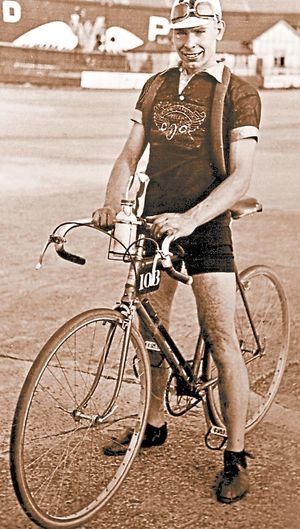
Cecil Anslow, known as "Cec" or "CJA" in cycle-racing circles, or by his second name Jim to friends and family, continued to enjoy the sport almost up until his death from cancer at Compton Hospice in 1999, at the age of 76.
"I seem to recall he restarted cycling in his 50s, so in the 1970s," says Dave, who added that he was once more competing in age-related races by the mid-1980s.
"CJA competed in at least one 200km or 125-miles event in his second cycling stint," he says.
"He won most the ones he entered, seeing off younger British and foreign riders.
"'Cec’ was certainly still riding competitively in 1994, as he medalled in the Merseyside Racing Club, Wild Wales event in 1994 when he would have been 72."
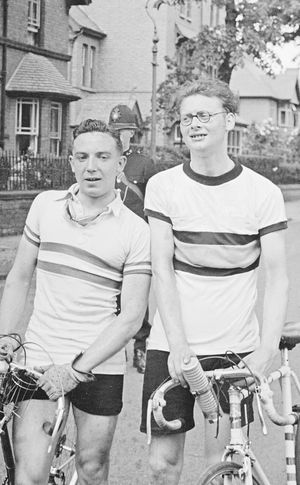
Aside from the anniversary of the race and the Commonwealth Games time trials coming to West Park, 2022 is poignant for another reason for Dave – July 7 marks what would have been his stepfather's 100th birthday.
Dave says he hopes to crowd-fund a blue plaque in honour of both Cec and Albert Price at the spot outside West Park where the race ended.
"I would love to know if any relatives of race winner Albert Price still live in Wolverhampton," he says.
*Are you related to Albert Price? Contact Mark Andrews on 01952 241491 or email mark.andrews@mnamedia.co.uk

